A Simple Bow
What is the appropriate response when a person comes face-to-face with the divine?
(Recently, I was asked to speak at a gathering of the Chequamegon Unitarian Universalist Fellowship about my personal spiritual journey and its connection to the Apostle Islands. This week’s offering is a version of what I presented)
Sometimes, I bow.
It is a slight gesture, so subtle even if you were standing shoulder-to-shoulder with me in the half-light of dawn you might not notice it. But sometimes, when I am finished photographing a scene that speaks deeply to me – northern lights flashing overhead, sunrise from inside of a sea cave – I will, just before I leave, set my camera aside for a moment, bring my hands together in front of my chest, and bow.
Why? What is it that’s wrapped up in that bow? How can one particular landscape – the Apostle Islands – deepen the joy and meaning I find in nature so much that I bow? The answers to those questions lie at the very heart of my spiritual journey.
Given my former life as a travel writer, I may not seem like the best proponent of the doctrine of staying in one place. For much of my life I traveled the world like a skipping stone. We travel for many reasons – to put ourselves in the shoes of other cultures, in the company of other species, to see the wonders of this bright shiny world we live in. Travel can teach us empathy and compassion, and connection. But something was missing.
“To be everywhere at once is to be nowhere forever,” wrote Edward Abbey. I was beginning to feel the weight of all those miles bearing down on my shoulders like an over-stuffed backpack. Then, one morning, I went for a walk.
It was early on a Sunday morning, way, way too early. Every sane creature in Bayfield was still asleep. Except for me. I had just returned from a place a week before I probably couldn’t have found on a map and was still not sure I was pronouncing correctly. Jet-lagged, I walked down to the Washington Street Beach in Bayfield and directly into the most beautiful sunrise I’ve ever seen – the whole sky seemed to be down on one knee admiring its reflection, a trio of ducks silhouetted and circling like dark stars.
I stood that morning just a few blocks from my Bayfield home wondering – “how far do I have to travel before I begin to see and appreciate the beauty right here in front of me?”
"The true journey of discovery,” Marcel Proust said, “consists not in seeking new landscapes but in having new eyes.” I did not want to be nowhere forever. I wanted to belong somewhere and that somewhere would be the Apostle Islands. So, I decided to make change.
In our travel obsessed society where you can be anywhere faster than the speed of a credit card transaction, some have questioned if I made the right choice, giving up a life of travel. There is no question that to put your roots down and forgo the world of instant, everywhere travel, there is a cost but I would contend that you also gain some things as well.
One of those things is local knowledge. On old maps where when things get complicated and dangerous it sometimes says “local knowledge advised.” Only someone who has been there, time and time again would know the intricacies of that place, its dangers and it safe passages. It is knowledge only earned by being there.
As tourists, we often visit a stunning landscape once, check it off our buckets list and move on never to see it again. With that kind of one-off experience, the landscape becomes frozen in our mind like a postcard memory, endlessly unchanging and stagnant.
When we focus on one place, our backyard, we begin to gather local knowledge, revisiting the same place over and over again, letting it become “familiar” (an interesting word that comes from the same root as the word “family”). Sometimes familiarity can be seen as a bad thing. But it doesn’t have to be: “Familiarity with things about one should not dull the edge of curiosity or interest.” John Burroughs wrote. “The walk you take today is the walk you should take to-morrow, and the next day, and next. What you miss, you will hit upon next time. If Nature is not at home to-day, call to-morrow, or next week.”
When you are rooted in a place, you have the luxury of returning today, tomorrow, next week. You can return to exactly the same spot over and over again - in stormy weather – on a beautiful summer day – with winter’ ice – autumn color – under the northern lights.
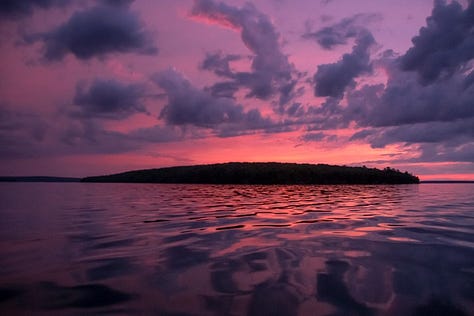
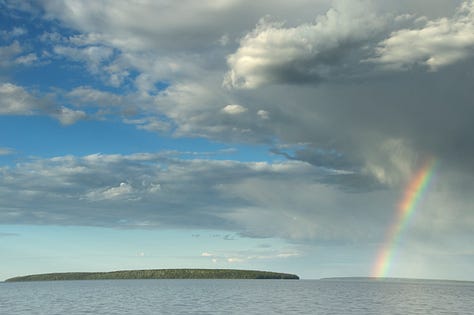
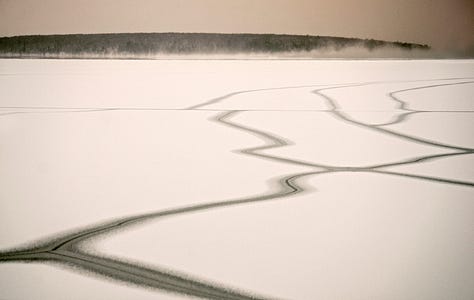
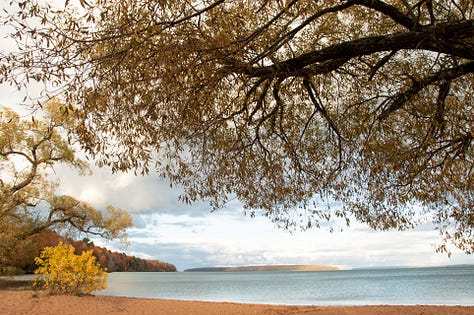
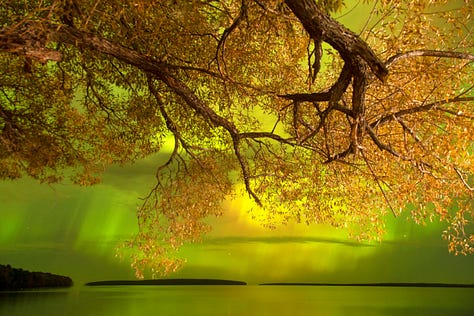

And slowly, you begin to realize that we do not live in a postcard world. Our world is alive and vibrant, flowing, and changing, right before our eyes. As a Greek philosopher said, “you cannot step in the same river twice.” It seems that is true as well for the river of time.
The second thing that you gain is the potential for a deeper relationship with a place. A tourist is here and gone. To sink down roots, you must develop and nurture a true relationship. As with any relationship - with another human or with a landscape — what we bring to that relationship colors it. To keep fresh, to keep seeing with “new eyes” the observer must constantly push themselves to go beyond the obvious, find new ways of seeing, new angles, new perspectives, see miracles in the mundane, the incredible in the commonplace.
When you do that, the doors of nature begin to open like a series of infinity rings.
This is where I begin to find the meaning. I’ve always felt a strong current of spirituality running through my life. But I’ve found it difficult to put a way-marker in any one belief or practice, any single denomination or creed – Catholic, Lutheran, Jewish, Buddhist, Muslim. I find myself blinded by the scriptures and hobbled by the testaments until my head spins. I flee the confines of the church to the open air of nature. And that is where I most find what I myself would call “the sacred.”
Out in nature – beneath the rumble of storm clouds or the infinite beauties of a snowstorm, or looking into the maze of a single plant – it is not hard to make the leap into a belief that there is a power greater than ourselves. “Whatever is upon the earth is of the earth” says John Burroughs again, “and reveals to me the workings of the same celestial power that fashioned the first man from common dust.”
That celestial power some may call Allah, or the Great Spirit, or Tao, or Brahma, or a host of other names, including the Judeo-Christian label God. But I don’t feel the need to label it, only to recognize and acknowledge it.
And when I do, I believe I am finally beginning to see is the divine in the simple beauty of nature itself.
If you believe in a creator – by whatever name you speak of it, when you begin to see the divine in the creation, you begin to see the sacred, or at least its reflection. What is by the creator, is of the creator. And that creation is everywhere, not just in the distant and exotic.
Thoreau said, “Heaven is beneath our feet as much as over our heads,” and so, it seems to me, is evidence of the divine.
One of the difficulties of the journey of seeing is the lack of a measuring stick. The divine does not come with a dial saying: you are two quarts down on the dipstick of the divine.
For me, however, I learned that I was indeed making progress because of a single tree.
There was this single tree, a brassy little birch tree on the edge of a bay that caught the last of the day’s light and just seemed FILLED with personality. I returned again and again to photograph it.
Until one day, after a particularly windy stretch of weather, I returned to the spot, set my tripod up, peered through the view finder and …
It was gone -- blown over in the storm.
I had a very visceral reaction, so strong it surprised me and at first, I felt foolish. I was mourning the loss of a single tree. Then, it dawned on me: I was morning the loss of a single tree!
I had taken the time to see it, recognize its beauty, its divinity perhaps, nurtured a connection with it, and so I was mourning its passing as I might have the loss of a friend.
I no longer feel that kind of connection with a place is in any way, foolish. In fact, it is in that very reaction that I find the bedrock of my spirituality, my connection to this world and whatever power there is that creates and sustains it, and me.
“To see a World in a Grain of Sand, And a Heaven in a Wild Flower, Hold Infinity in the palm of your hand, And Eternity in an hour” – wrote William Blake in the “Auguries of Innocence.”
I sometimes feel as though we are in a kind of heaven here on Lake Superior and the Apostle Islands. But it is not a passive heaven. It requires of us at least two things: the courage to work to protect it and the creativity and curiosity to push ourselves to look, look deeper, and look again.
What we will see when we do is, at least to me, the divine. I see it in the glimmer of sunlight off the waters. Or an eagle feather adrift in Lake Superior. Or a swirl of color on a cliff face. Or the hieroglyphics of the northern lights
“Above all else,” writes, my friend Richard Nelson, “we should assume that power moves in the world around us and act accordingly.”
And so, when I feel the fingertips of the divine brushing my face on those solitary mornings or late evenings in the islands. I clasp my hands in front of my chest and in a simple and subtle gesture of gratitude,
I bow.
— Jeff Rennicke (all photographs by the author unless otherwise noted).
To see and hear a recording of this speech, click the button below and scroll to the 01/05/2025 Jeff Rennicke recording.

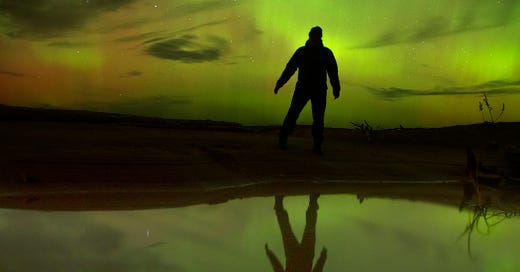





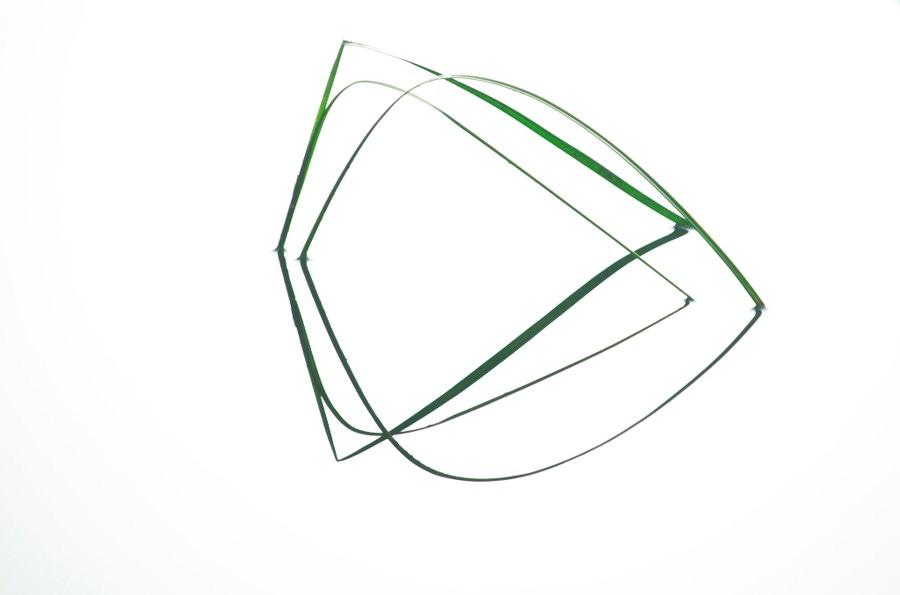
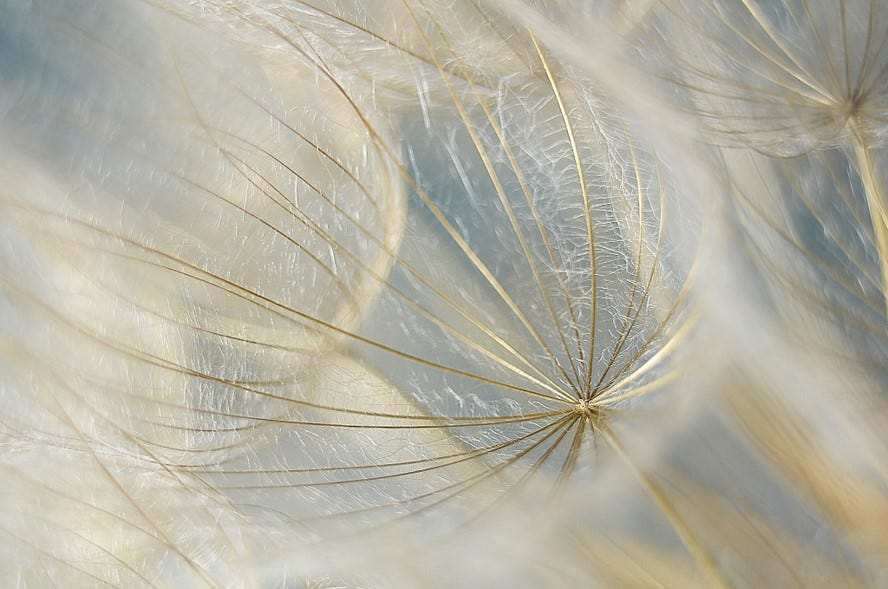




You beautifully put words to my experience and perspective, Jeff. Thanks!
But I'm not sure you can't have both. My wife, Lori Erickson, is a spiritual travel writer (think pilgrimage) now working on her fifth book on the intersection of spirituality and travel and I'm a travel photographer. We have found the kind of spiritual connections through nature you describe in many places. We also spend about 300 days/year deeply rooted in the natural world where we live. It takes daily meditative practice (think "attention") to make the kind of connection your describe, but I've experienced it in the SD Badlands, Cappadocia Turkiye, Norwegian fjords, and Costa Rican rainforest as well as in my daily walks in the woods here.